In a small cubicle, a bowl, a pair of chopsticks, a dish and a spoon are neatly placed on the table. It is the most common layout of the “solo-dining” restaurant now. While previously seen as a sad dining experience, now with a straw cushion, roses, a singer, and some cute porcelain dolls around, everyone can enjoy dining alone.
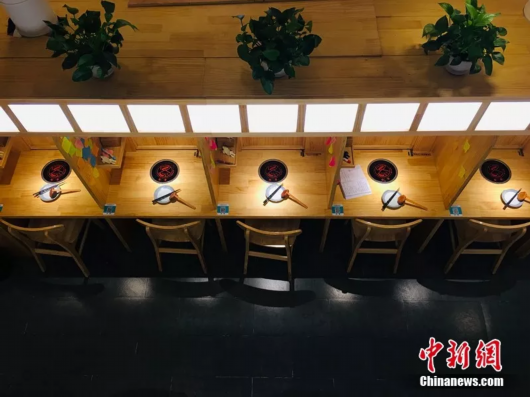
The layout of the “solo-dining” area (Photo/Chinanews.com)
Recently, a Japanese-style hotpot restaurant in Wuhan featuring “solo-dining” divided the restaurant into four areas – “Island Area”, “Hermit Area”, “Seeker Area” and “Unbounded Area”. Among those areas, "solo-dining" is available in the “Seeker Area”, where there are twelve seats in all, each equipped with a roll curtain through which the waiter can directly serve the dishes.
This privacy means that you can now enjoy eating in your own private space, paying no heed to any contemptuous glances from those too scared to dine alone.
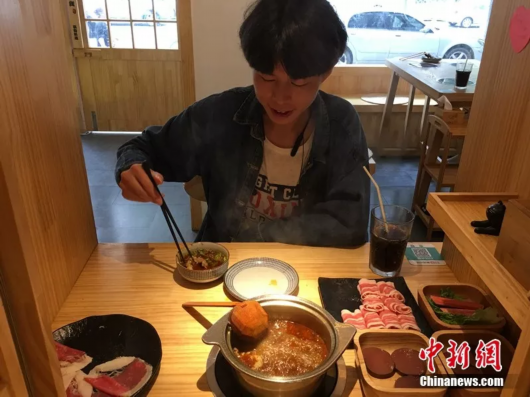
A customer enjoying a solo-dining cubicle
The restaurant was opened in May, 2018, by Hao Jing, a 40-year-old businessman with 17 years of experience in the catering industry in Canada, and his two partners.
Hao Jing said people used to dine together, but with the nature of modern society, the number of single people eating out is on the rise. In Chinese culture especially, a person dining out alone can be seen as desolate. So Hao hopes to provide those lonely people with a haven of serenity. That’s how the idea of “solo-dining” came to his mind.
According to Hao, customers coming to experience solo-dining are mostly young people. “Solo-dining is still a new thing for the majority, and it will take some time for the public to accept it,” said Hao. But he believes with high-quality food and good service, “solo-dining” will be accepted by more over time.
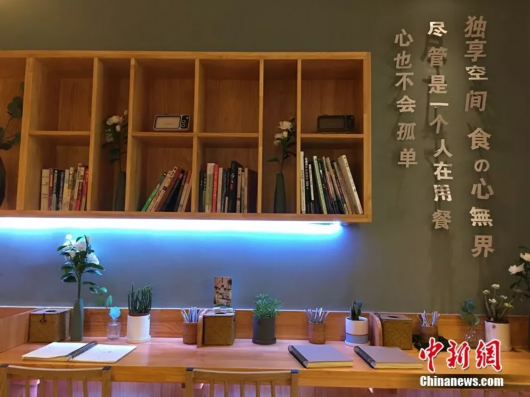
A corner in Hao’s restaurant
Relevant reports reveal that the idea of catering to solo-dining emerged in 2018. Eating alone can avoid tedious social activities, and allows modern people to save time and trouble in their daily life.
Data also shows that in 2018, sales of food related to solo-dining increased by more than 60% year-on-year. The best selling food includes self-heating hot pot, self-heating bobo chicken, self-heating river snail rice noodles, and instant soup. And the main purchasers are people aged 26-35 years old, with the top five areas where solo-dining consumption has increased dramatically being Jiangxi, Shanghai, Fujian, Ningxia and Heilongjiang.
Yang Ziyu, a young man from Yunnan, has just finished the college entrance examination. In July this year, he came to Wuhan alone for his graduation trip.
As he thinks a group of people enjoy their camaraderie, while a single person enjoys his own freedom, traveling alone on holidays has been Yang’s pleasure of life since high school. So far, he has been to Shanghai, Lijiang, Beijing, Hangzhou, Nanjing, Hong Kong and other places. Yang said on these journeys he had sometimes traveled with friends, but problems frequently occurred. When he travels alone, he doesn't have to accommodate others and feels more comfortable and relaxed.
But having meals alone is always an embarrassing thing for him. It’s hard to find a nice restaurant for a hearty meal without being conspicuous. After coming upon a solo-dining restaurant online he couldn’t wait to go find the place in Wuhan and have a try.
In the cubicle, Yang dipped sliced mutton into his hoisin sauce while browsing his cellphone. He says that besides the delicious food, he also enjoys the pleasure of being alone.
Han Xiao is a 23-year-old from Northeast China. She has been studying and working in Wuhan for six years. Now she is a frequent visitor to solo-dining restaurants, going to them at least six or seven times a month.
Han says she loves spicy broth, but she finds it hard to find people to eat with because her boyfriend lives in a different place, and she has few friends around. Every time she goes to have hot pot alone, she always has feelings of loss and hollowness, especially when people around her are all accompanied by others. The solo dining experience largely dispels that gloom and allows her to enjoy her meal as much as other diners, if not more so.
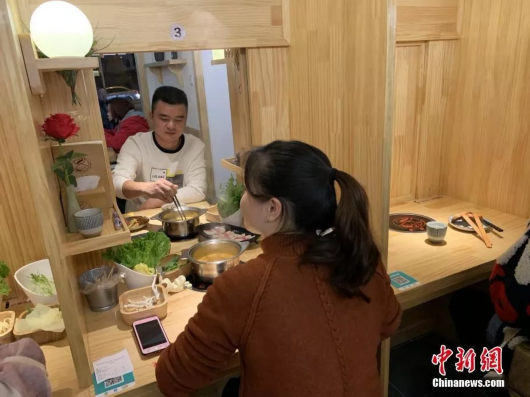
A hot pot restaurant in Wuhan, Hubei province, has successfully paired off many strangers
The emergence of solo-dining exactly catered to her need. She says that there are similar small hot pots in the northeast, which are called rotary hot pots, and that reminds her of her hometown.
But for Wang Le, a 34-year-old single mother, solo-dining comforted her in a different way. She is always busy with clients and works every day, and her high-intensity work and frequent business trips force her to skip meals. And when Wang comes home from work, she puts her heart and soul into her children and thus feels that she is "kidnapped" by life. But dining time is her precious time for a rest. In the solo-dining restaurant, she can seek refuge from her heavy life burden and take a breath.
In recent years, with the rapid development of China's economy and changing values, more and more young people have left home and begun to make their careers in big cities. They are called "empty-nest youths" because of being away from relatives and friends and living alone. They have few interpersonal relationships and rely on the Internet a lot. According to data released by the National Statistical Yearbook, the number of "empty-nest youths" in China now exceeds 58 million, and is still on the rise. Some organizations even predict that by 2021, the number of this population will rise to 92 million.
Hence, the “solo-economy” inspired by empty-nest youths has gradually been catered for by businesses. In addition to the catering industry, the small household appliances industry, tourism industry, fitness industry, and property industry, among others, have launched special products and services for single people.
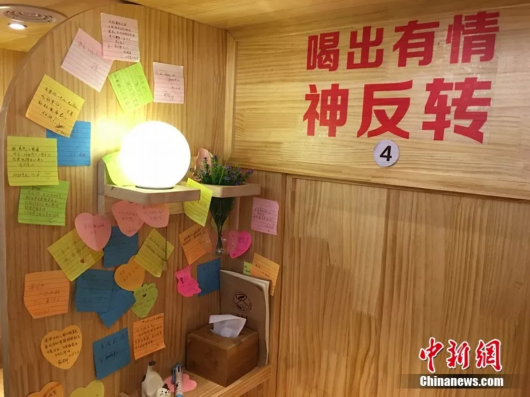
The cubicle is covered with notes left by customers.
Looking into this phenomenon, Mei Zhigang, director of the Center for Social Welfare Research of the Central China Normal University, believes that because of the changes of attitudes towards life, young people are pursuing more both on a material and soulful level. Whether or not they are "empty-nest youths" from their own initiatives, they should be given respect for their choices of lifestyle.

People who are used to being alone, through choice or circumstance, usually love the concept of “solo-dining”. They don't need to cater to others, have meals that they don’t actually like, try hard to find common ground in order to avoid embarrassment, or have to avoid the stares of unenlightened others. In a refined cubicle, some delicious food and undisturbed peace are just solo diners’ desire.
